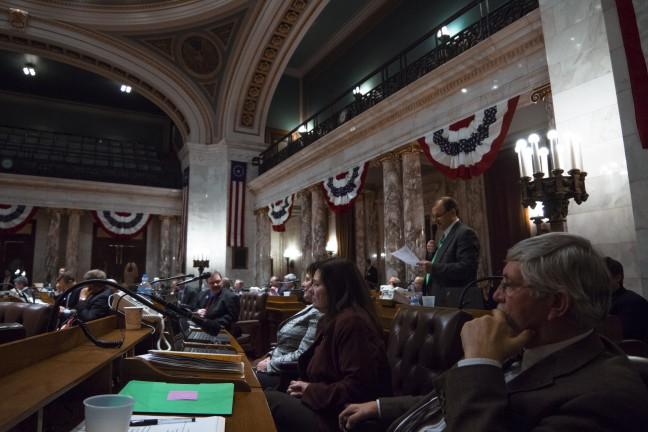Ride-sharing companies had a victory Tuesday after a series of obstacles since their entry into Madison, as the state Assembly passed legislation that enacted statewide regulations.
This bill requires companies like Uber and Lyft to conduct background checks and have a non-discrimination policy. The bill has faced opposition because local governments are unable to set stricter restrictions.
The bill passed the Assembly on a 79-19 vote, and it now heads to the Senate.
Rep. Cory Mason, D-Racine, an author of the bill, said taxi cab companies and ride-sharing companies were not comparable. He said the two were as different as “cellphones are from landlines,” as they both had a different set of regulations. Mason said ride-sharing companies are meeting a demand for people in Wisconsin.
“This is the future,” Mason said. “It’s coming. It’s here.”
Critics of the bill said it was an anti-local control bill since similar regulations are already in place in several Wisconsin cities.
Assembly Minority Leader Peter Barca, D-Kenosha, said supporters of the bill were erasing city regulations, such as ordinances Milwaukee passed and ones that Madison has considered.
“You go and do away with the ordinances that have already been passed,” Barca said.
Rep. Lisa Subeck, D-Madison, said the regulations in the bill wrongly inhibit local governments and that the regulations would be weaker than those in other states that have passed similar bills.
Subeck called the bill an attack on the city of Madison.
“Let’s make this about more than politics; let’s make this about doing what’s right,” Subeck said.
Rep. Tyler August, R-Lake Geneva, one of the bill’s authors, said the bill was a great example of “reaching across the aisle,” with its bipartisan support. August said Uber and Lyft are companies the market wants.
August said he believes the bill will be a model for other states looking to regulate ride-sharing.
“Other states are going to look at this bill and say, ‘That’s how you get things done, that’s how you protect consumers,’” August said.
The Assembly also passed legislation on banning microbeads on a voice vote.
If the bill becomes law, Wisconsin would be the third state that would ban microbeads. Microbeads are generally used over natural alternatives like sea salt or oatmeal.
Microbeads have been found in the water or beaches of all five Great Lakes. Mason said the small non-biodegradable particles that are harmful to the environment, with studies showing millions of them in the Great Lakes.
Rep. Gary Hebl, D-Sun Prairie, said these microbeads absorb toxic chemicals and damage wildlife ecosystems. Hebl said this bill will benefit more than just Wisconsin.
“Passing this bill isn’t just a win for the Wisconsin environment,” Hebl said. “It’s a win for lakes, rivers and other waterways across our great nation.”
The microbeads bill now heads to Walker’s desk for his signature.
Sarah Zimmermann contributed to this story.


